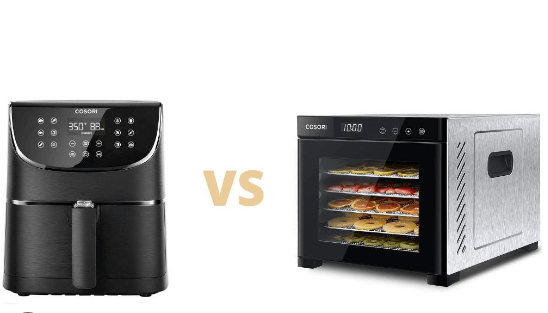Food Dehydrator vs. Air Fryer: Purchasing the appropriate kitchen appliance can be challenging. In this post, I will explain the differences between an air fryer and a food dehydrator, as the search for the right one can feel overwhelming.
Whether you’re preparing a meal for your family or whipping up a delicious snack, you’ll feel confident that you’ve made the best selection possible.
Read More: L’EQUIP FilterPro 6 Tray Food Dehydrator Review
Table of Contents
What is an air fryer?
Air fryers use hot air for cooking food at a high temperature without oil. Typically, the appliance’s heat source is a fan that blows heated air through a metal basket.
Due to the absence of oil, air fryers are ideal for cooking vegetables and meats like chicken wings. Additionally, they are ideal for baking bread and cookies because the dry heat makes them crisp without burning the exterior. An air fryer is a versatile appliance that can often be used for purposes other than air frying.
What is a dehydrator?
A dehydrator is a device used to dry fruits and vegetables. Utilizing heat to evaporate the food’s moisture content, leaving behind dried fruits and vegetables.
The process takes less than thirty minutes for the majority of foods, making it ideal if you want to always have healthy snacks on hand. Raw foodists frequently favor food dehydrators.
What Can You Cook in an Air Fryer?
An air fryer makes short work of frying a variety of foods without oil, so you don’t have to worry about grease splattering throughout your home. You can cook foods such as chicken wings, fish sticks, french fries, onion rings, and vegetables without having to stand over the stove.
It also includes a timer function to prevent accidental burning. Even most frozen foods can be cooked in an air fryer. The list of foods that can be cooked in this small appliance is exhaustive. You can even prepare healthy snacks such as apple slices in the air fryer.
What Can You Cook in a Dehydrator?
The most obvious answer is dried fruit, but you can also make delicious beef jerky, bread, crackers, chips, granola bars, pizza crust, dehydrated snacks, and banana chips, among many other things. Cinnamon sugar-coated dehydrated apple slices are one of my personal favorites. A dehydrator is an excellent method for preparing food surpluses for survival packs.
The Similarities Of Food Dehydrator vs. Air Fryer
Before delving into the differences between dehydrators and air fryers, I would like to highlight the similarities between the two cooking machines.
Heat And Fan Systems
Both dehydrators and air fryers have heat and fan capabilities. Together, these elements generate a hot airflow surrounding the food storage area.
Oil-Free Food Outcome
Dehydrators and air fryers are capable of cooking food without the use of cooking oil. Consequently, food quality is always nutritious.
Timers
Dehydrators and air fryers always include an adjustable timer. It assists in configuring cooking modes and durations suitable for each individual food.
Safety And Convenience
These air fryers and dehydrators have compact designs to prevent cleaning difficulties and accidental fires.
Limitations of Air fryers
Regarding cooking, an air fryer has a few restrictions. If you have a very large family, even the largest air fryers might be unable to accommodate everyone. Air fryers are optimal for families of four or fewer. Air fryers rely on hot air circulation to cook the food, so if you overcrowd the basket, the interior food will not cook and crisp appropriately. The size of your air fryer will depend significantly on how many people you intend to cook for.
Limitations of Dehydrators
Size is the most obvious limitation of a food dehydrator. If you want to make a large quantity of something like jerky, you will need a larger machine because it requires a lot of space. If you intend to make only small quantities of snacks, however, a smaller model will suffice. Consider your storage space before purchasing a dehydrator.
Another limitation is that they typically do not include recipes. Therefore, you will need to find a recipe online or adopt one from a different type of appliance. Dehydrators are also single-method cooking appliances. Consequently, you will only be able to utilize a dehydrator to dehydrate food.

Pros And Cons Of Dehydrator
Pros
- The use of a dehydrator reduces the amount of time spent cooking at home.
- The machine will solve the problem of food waste when it cannot be consumed all at once.
- The dehydrator has the ability to increase sugar levels so that it can sweeten your fruits.
Cons
- Vitamins C and A may be diminished by dehydration.
- Some models are incompatible with high-fat foods, such as beef jerky.
- The weight and appearance of the food will change as a result of the dehydration process.
Pros And Cons Of An Air Fryer
Are there advantages and disadvantages to using an air fryer? Keep your focus on this post to discover the answer.
Pros
- It can reduce the amount of fat in your daily meals by more than 70 percent.
- The machine will assist in defrosting food during the cooking process.
- It prevents burn accidents caused by hot cooking oil.
- Because food is cooked in an air fryer’s enclosed space, your home will not acquire an odor of cooking oil.
- The air fryer’s design is compact and suitable for studio apartments.
- It is versatile and can be used to bake, steam, roast, and grill.
- The use of an air fryer does not require a chef’s expertise.
Cons
- Despite healthy food production, some eaters find the flavor of the food to be unappealing.
- A single-air dryer is inefficient for families with multiple members.
- Due to the high-speed fan, the fryer will make a loud noise while cooking.
- This difficulty complicates the cleaning process.
- High electric consumption: the greater the capacity, the greater the amount of electricity used.



